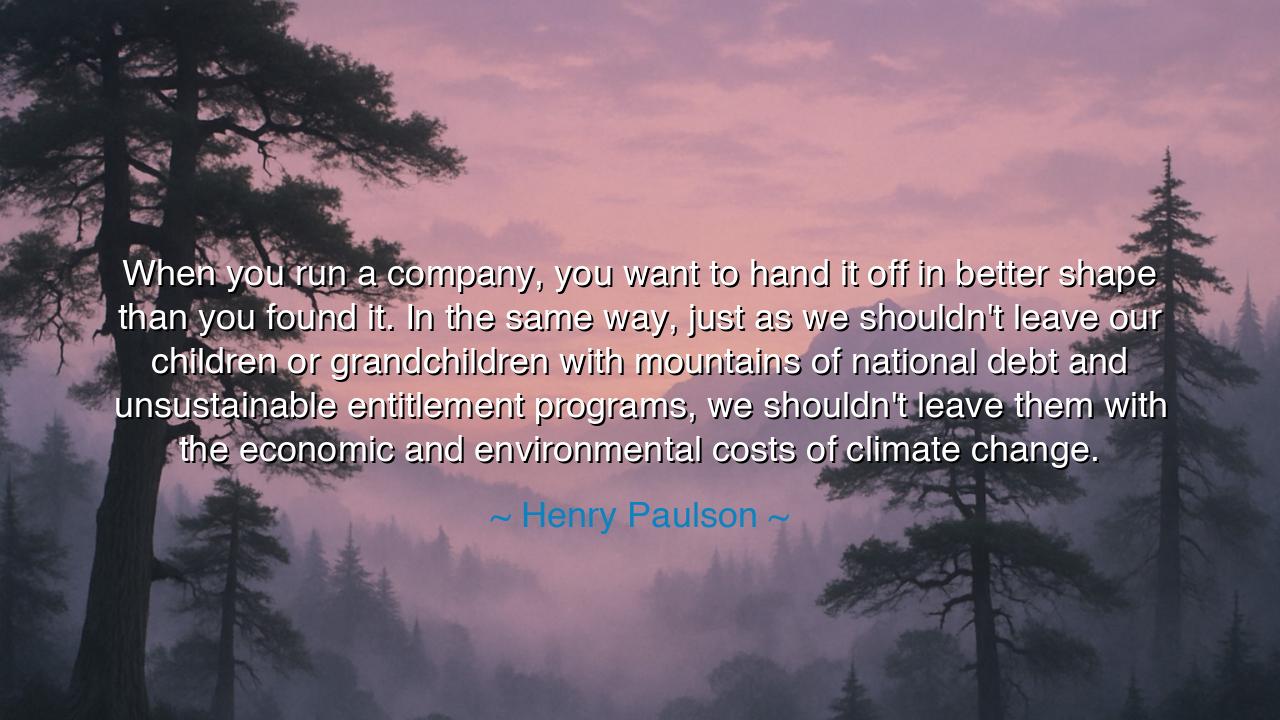
When you run a company, you want to hand it off in better shape
When you run a company, you want to hand it off in better shape than you found it. In the same way, just as we shouldn't leave our children or grandchildren with mountains of national debt and unsustainable entitlement programs, we shouldn't leave them with the economic and environmental costs of climate change.






In the books of stewardship, this is a law writ in flame: “When you run a company, you want to hand it off in better shape than you found it.” So speaks Henry Paulson, and the echo rolls beyond the counting-house to the cradle and the coast. For he binds commerce to kinship, declaring that just as we dare not burden our children and grandchildren with mountains of national debt and unsustainable entitlement programs, neither may we abandon them to the economic and environmental costs of climate change. Hear the old melody in a modern key: take your turn upon the earth, and leave it tidier than you met it.
The ancients called this the covenant of the stewards. To run a company is to be entrusted with tools, people, land, and time. To hand it off is to pass the torch without scorching the hands that follow. Profit without posterity is a pyre; profit with posterity is a lighthouse. The balance sheet that matters in the end has lines for air and water, for trust and soil, for the long breath of communities. To ignore these is to loot your own legacy; to honor them is to make your success durable as oak.
Paulson’s pairing is deliberate and sharp. We recoil from bequeathing debt that compounds; shall we then be easy about bequeathing damage that compounds faster? Climate change is interest charged by the sun and the sea—accruing in economic costs from broken supply chains and swollen insurance claims, and in environmental costs from withered fields, drowned neighborhoods, and wandering seasons. A leader who understands finance already knows this tune: unpriced risk is the most expensive kind, and delayed payment is the cruelest creditor.
Consider a story from our own republic’s marrow. In the age of smoke and timber barons, President Theodore Roosevelt and forester Gifford Pinchot looked upon rivers choked with silt and hills stripped to bone. They could have feasted and passed the plate, but they chose another table. They set aside forests, founded refuges, husbanded watersheds—converting a spree into a trust. Industry did not end; it matured. The nation learned that conservation was not the enemy of prosperity but its condition. This is the same arithmetic Paulson names: strengthen the house now, and your descendants will not live under tarps.
There is also the household parable, small and piercing. A craftsman keeps a workshop—tools sharp, floors clear, accounts in order. He knows his apprentices will one day inherit the bench. If he spends the savings on trinkets and leaves sawdust piled by oily rags, he does not love them; he flatters himself. But if he maintains his gear, invests in better lighting, teaches the safe cuts, and stocks good wood for their first commissions, he has practiced the quiet heroism of handing it off in better shape. From shop to nation to planet, the rule does not change—only the scale of our courage.
What, then, is the lesson we carry to the market and the council? That stewardship is the highest form of leadership, and intergenerational responsibility its proving ground. To build for a quarter is easy; to build for a century requires the humbler arts—measurement, restraint, repair. Let your policies speak the language your heirs will understand: clean air, stable prices, resilient grids, unpoisoned water, arable soil. Let your signature mean: “I took my share—no more; I paid my share—at least.”
Practical counsel for those who would walk this path: (1) Set explicit, dated goals to cut economic exposure to climate change—science-based emissions targets, resilient procurement, diversified sites above rising waters. (2) Price carbon inside your own decisions so the invisible becomes visible; invest where lifetime costs, not headline costs, are lowest. (3) Disclose risks and progress with the candor you’d demand from a trustee of your child’s inheritance. (4) Shift benefits from “unsustainable” promises to durable wellbeing—health, training, and communities that weather shocks. (5) Restore what you use: energy with renewables, water with replenishment, forests with planting, soils with regeneration. Do these things, and when your watch ends you will step aside unashamed—for you will have kept the ancient vow: to receive, to increase, and to return in better shape than you found.






AAdministratorAdministrator
Welcome, honored guests. Please leave a comment, we will respond soon